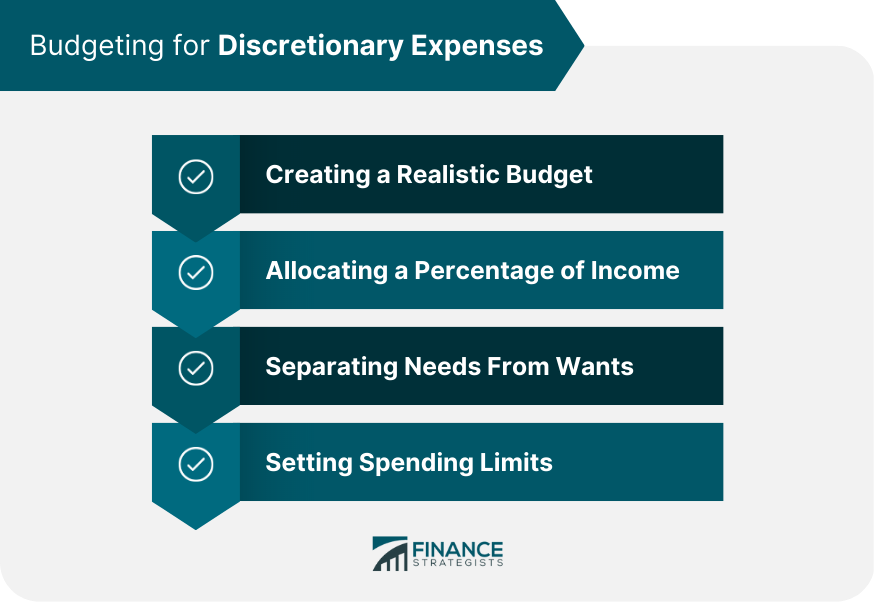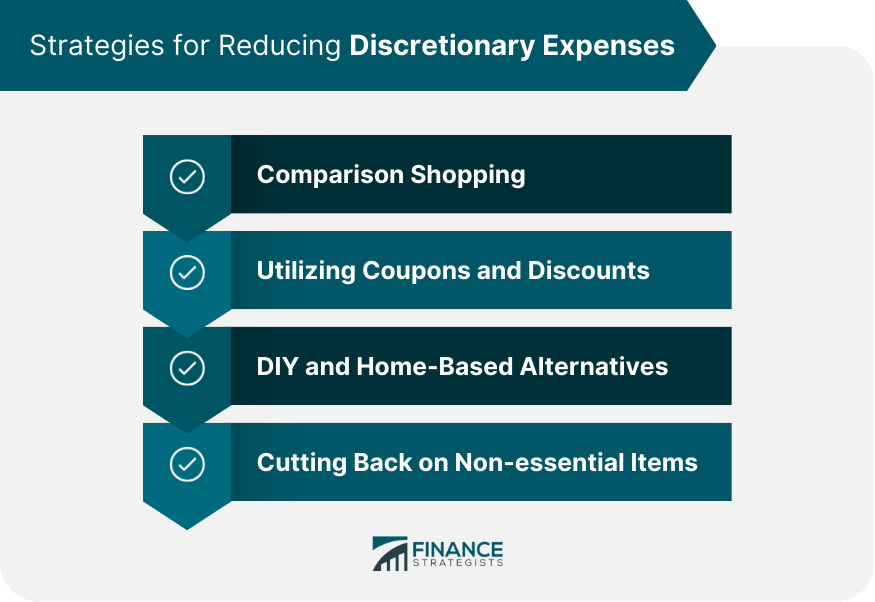Discretionary expenses refer to non-essential spending on goods and services that are not required to maintain basic living standards. These expenses are often associated with leisure, entertainment, and personal indulgence. Proper management of discretionary expenses is crucial for maintaining financial stability and achieving financial goals. By controlling discretionary spending, individuals can prioritize savings, reduce debt, and allocate resources to essential needs. Discretionary expenses can be divided into various categories, such as dining out, hobbies, travel, and personal care. Explore the common types of discretionary expenses, budgeting strategies, and tips for reducing discretionary spending while maintaining a balanced lifestyle. Eating at restaurants, going to the movies, or attending concerts are examples of discretionary spending on dining out and entertainment. These expenses can add up quickly and have a significant impact on one's budget. Spending on hobbies and recreational activities, such as sports equipment, art supplies, or memberships to clubs, also falls under discretionary expenses. These costs can vary widely depending on individual interests and preferences. Travel and vacations are often significant discretionary expenses, including airfare, accommodation, and sightseeing. These costs can be managed through budgeting and planning, but they still represent non-essential spending. While clothing is a necessity, spending on high-end brands, luxury items, or excessive purchases is considered discretionary. This category also includes accessories such as jewelry, handbags, and shoes. Purchasing the latest smartphones, tablets, or gaming consoles are examples of discretionary spending on electronics and gadgets. These items can be expensive and may need to be balanced against other financial priorities. Discretionary expenses in personal care and beauty include salon visits, spa treatments, and high-end cosmetics. These costs can be reduced through DIY alternatives or by finding less expensive options. To manage discretionary expenses, create a realistic budget that accounts for all sources of income and essential expenses. This process will help identify how much money can be allocated to discretionary spending without jeopardizing financial stability. One popular budgeting method is to allocate a specific percentage of income to discretionary expenses, such as the 50/30/20 rule. This approach suggests allocating 50% of income to essential needs, 30% to discretionary wants, and 20% to savings and debt repayment. Distinguish between essential needs and discretionary wants to better control spending. This distinction can help prioritize spending on necessities and allocate the remaining funds to discretionary expenses. Establish spending limits for discretionary expense categories to maintain control over spending. Regularly review and adjust these limits to ensure they remain appropriate for current financial goals and circumstances. When making discretionary purchases, compare prices across multiple retailers to find the best deals. This practice can help save money without sacrificing quality or enjoyment. Take advantage of coupons, discounts, and sales to reduce discretionary spending. These savings opportunities can be found online, in newspapers, or through mobile apps. Consider do-it-yourself or home-based alternatives to discretionary expenses, such as cooking at home, engaging in hobbies that require minimal investment, or exercising without a gym membership. Evaluate discretionary spending habits and identify areas where costs can be reduced. For example, limit dining out to special occasions, eliminate unnecessary subscriptions, or postpone non-essential purchases. Tracking discretionary spending is crucial for understanding where money is being spent and identifying opportunities to reduce costs. Regularly monitoring expenses can also help identify patterns and develop healthier spending habits. Various tools can help track and monitor discretionary expenses, such as budgeting apps, spreadsheets, or expense tracking software. These tools can provide valuable insights into spending habits and help individuals stay on track with their financial goals. Consistently review discretionary spending and make adjustments as needed. This practice ensures that spending remains within budget limits and supports long-term financial goals. Ensure that discretionary spending does not impede progress towards savings and debt repayment goals. Prioritize setting aside funds for an emergency fund, retirement savings, or paying off high-interest debt before allocating money to discretionary expenses. Set short- and long-term financial goals to provide a clear direction for discretionary spending decisions. These goals can help individuals determine how much money should be allocated to discretionary expenses and when to adjust spending habits. If financial goals are not being met, evaluate discretionary spending habits and make necessary adjustments. This may involve cutting back on certain expenses, reallocating funds, or finding alternative sources of income. Discretionary expenses play a significant role in financial planning and overall quality of life. By managing these expenses effectively, individuals can enjoy the things they love while maintaining financial stability and working towards long-term financial success. Finding the right balance between enjoyment and financial responsibility is crucial for maintaining a healthy financial life. By making informed decisions about discretionary spending, individuals can enjoy their preferred lifestyle without sacrificing financial security. Developing healthy spending habits and consistently monitoring discretionary expenses can lead to long-term financial success. By prioritizing financial goals and making thoughtful spending decisions, individuals can create a stable financial foundation and work towards achieving their dreams.What Are Discretionary Expenses?
Common Types of Discretionary Expenses
Dining Out and Entertainment
Hobbies and Recreation
Travel and Vacations
Clothing and Accessories
Electronics and Gadgets
Personal Care and Beauty
Budgeting for Discretionary Expenses
Creating a Realistic Budget
Allocating a Percentage of Income
Separating Needs From Wants
Setting Spending Limits

Strategies for Reducing Discretionary Expenses
Comparison Shopping
Utilizing Coupons and Discounts
DIY and Home-Based Alternatives
Cutting Back on Non-essential Items

Tracking and Monitoring Discretionary Expenses
Importance of Tracking Spending
Tools for Monitoring Discretionary Expenses
Regularly Reviewing and Adjusting Spending Habits
Balancing Discretionary Expenses With Financial Goals
Prioritizing Savings and Debt Repayment
Establishing Short- and Long-Term Financial Goals
Adjusting Discretionary Spending to Support Goals
Conclusion
The Role of Discretionary Expenses in Financial Planning
Importance of Balancing Enjoyment and Financial Responsibility
Developing Healthy Spending Habits for Long-Term Financial Success
Discretionary Expenses FAQs
Discretionary expenses are expenses that are not essential to daily living and can be postponed or avoided without affecting one's basic needs, such as food, shelter, and clothing. Examples of discretionary expenses include dining out, entertainment, travel, and luxury items.
Tracking discretionary expenses can help individuals or households identify areas where they can cut back on spending to save money and prioritize their financial goals. It can also provide insight into spending patterns and help to create a more realistic budget.
Some ways to reduce discretionary expenses include limiting the frequency of dining out, finding free or low-cost entertainment options, choosing less expensive travel options, and prioritizing needs over wants when making purchases.
The amount of income to allocate to discretionary expenses varies depending on an individual's financial situation and priorities. Some financial experts recommend using the 50/30/20 rule, which allocates 50% of income to necessities, 30% to discretionary expenses, and 20% to savings and debt repayment.
Some strategies for managing discretionary expenses include setting a monthly spending limit for certain categories, such as dining out or entertainment, using cash instead of credit to limit spending, and regularly reviewing spending patterns to identify areas where adjustments can be made. It's also important to prioritize financial goals and make sure discretionary expenses are not preventing progress toward those goals.
True Tamplin is a published author, public speaker, CEO of UpDigital, and founder of Finance Strategists.
True is a Certified Educator in Personal Finance (CEPF®), author of The Handy Financial Ratios Guide, a member of the Society for Advancing Business Editing and Writing, contributes to his financial education site, Finance Strategists, and has spoken to various financial communities such as the CFA Institute, as well as university students like his Alma mater, Biola University, where he received a bachelor of science in business and data analytics.
To learn more about True, visit his personal website or view his author profiles on Amazon, Nasdaq and Forbes.















